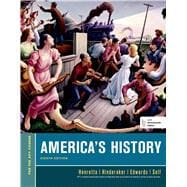Your go-to book for the AP U.S. History redesign.
America's History offers a thematic approach and skills-oriented pedagogy that helps students succeed in the redesigned AP U.S. History course. Known for its attention to AP themes and content, the new edition features a new nine part structure closely aligned with the chronology of the new AP U.S. History course, an expanded documents program, and a wealth of supporting resources that give teachers and students the tools they need to master the course and the new exam. The eighth edition also rolls out Bedford/St. Martin's new digital history tools, including LearningCurve, an adaptive quizzing engine that garners over a 90% student satisfaction rate, and LaunchPad, the all new interactive e-book and course space that puts high quality easy-to-use assessment at your fingertips. Featuring video, additional primary sources, a wealth of adaptive and summative quizzing, and more, LaunchPad cements student understanding of the text while helping them make progress toward learning outcomes. It's the best content joined up with the best technology.
*AP is a trademark registered and/or owned by the College Board, which was not involved in the production of, and does not endorse, this product. View a sample chapter.
America's History offers a thematic approach and skills-oriented pedagogy that helps students succeed in the redesigned AP U.S. History course. Known for its attention to AP themes and content, the new edition features a new nine part structure closely aligned with the chronology of the new AP U.S. History course, an expanded documents program, and a wealth of supporting resources that give teachers and students the tools they need to master the course and the new exam. The eighth edition also rolls out Bedford/St. Martin's new digital history tools, including LearningCurve, an adaptive quizzing engine that garners over a 90% student satisfaction rate, and LaunchPad, the all new interactive e-book and course space that puts high quality easy-to-use assessment at your fingertips. Featuring video, additional primary sources, a wealth of adaptive and summative quizzing, and more, LaunchPad cements student understanding of the text while helping them make progress toward learning outcomes. It's the best content joined up with the best technology.
*AP is a trademark registered and/or owned by the College Board, which was not involved in the production of, and does not endorse, this product. View a sample chapter.








